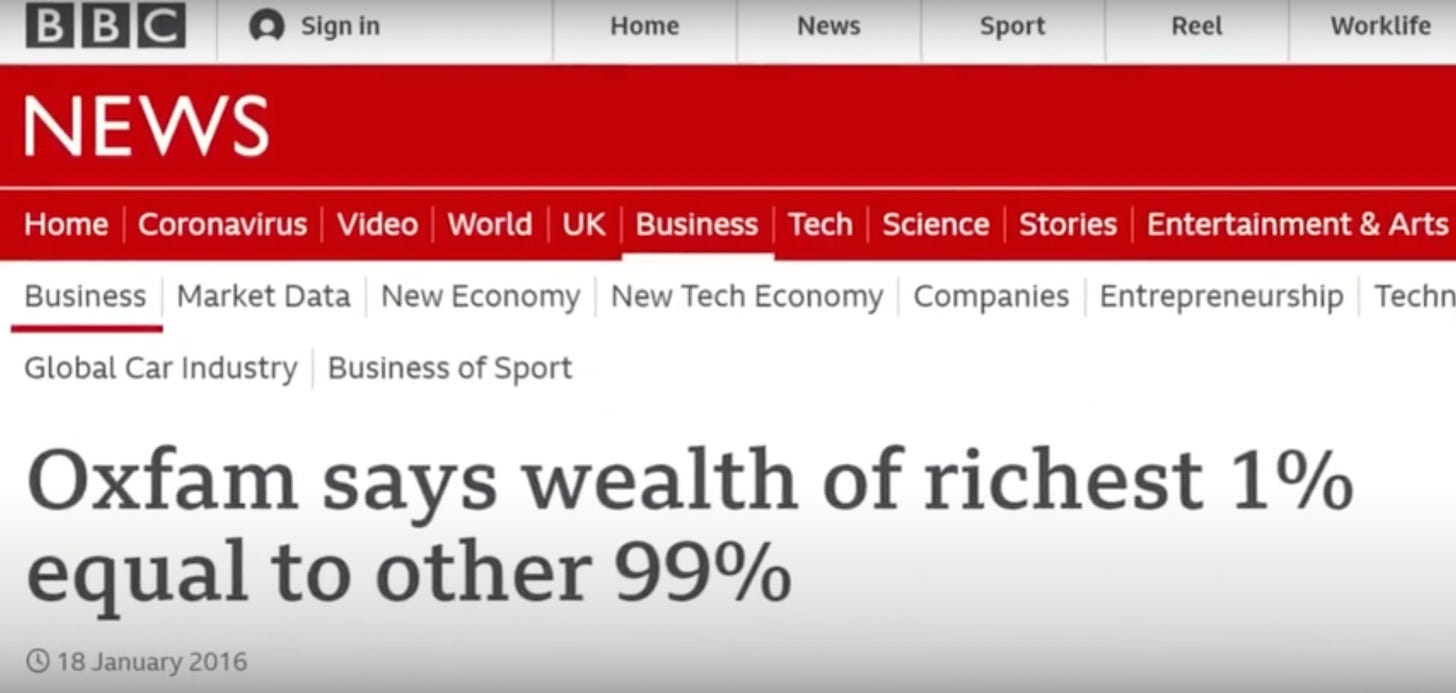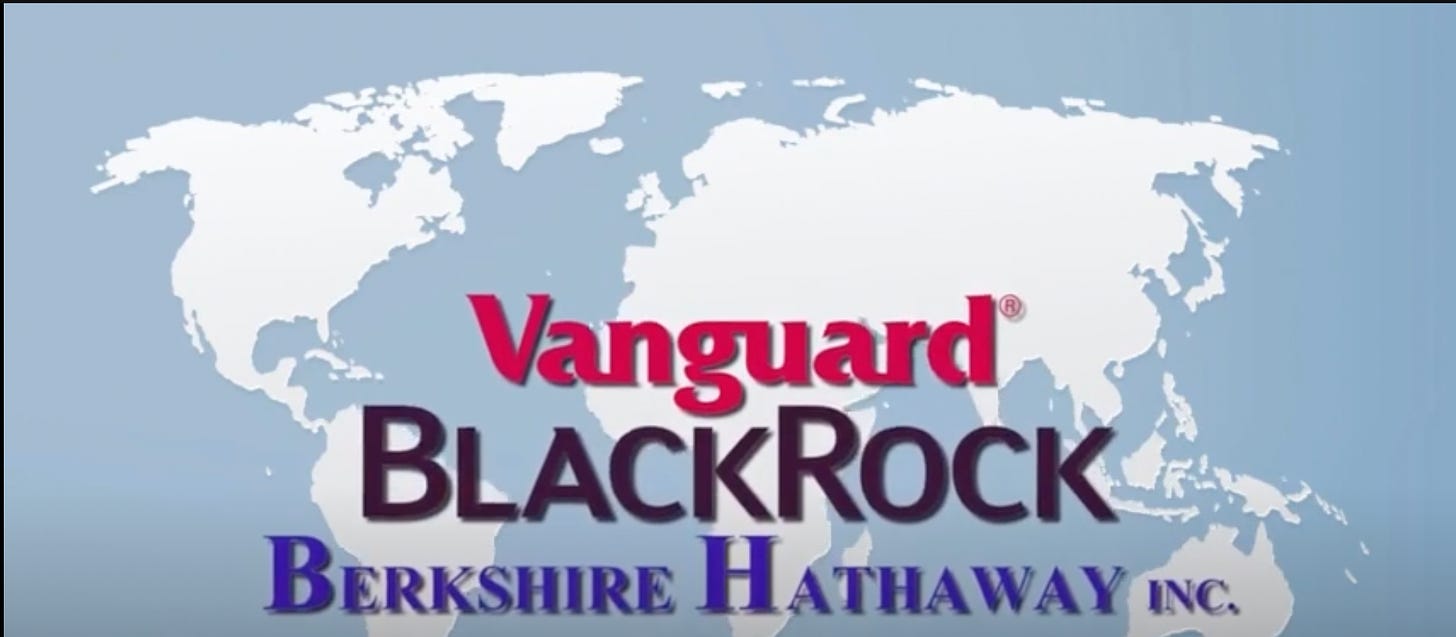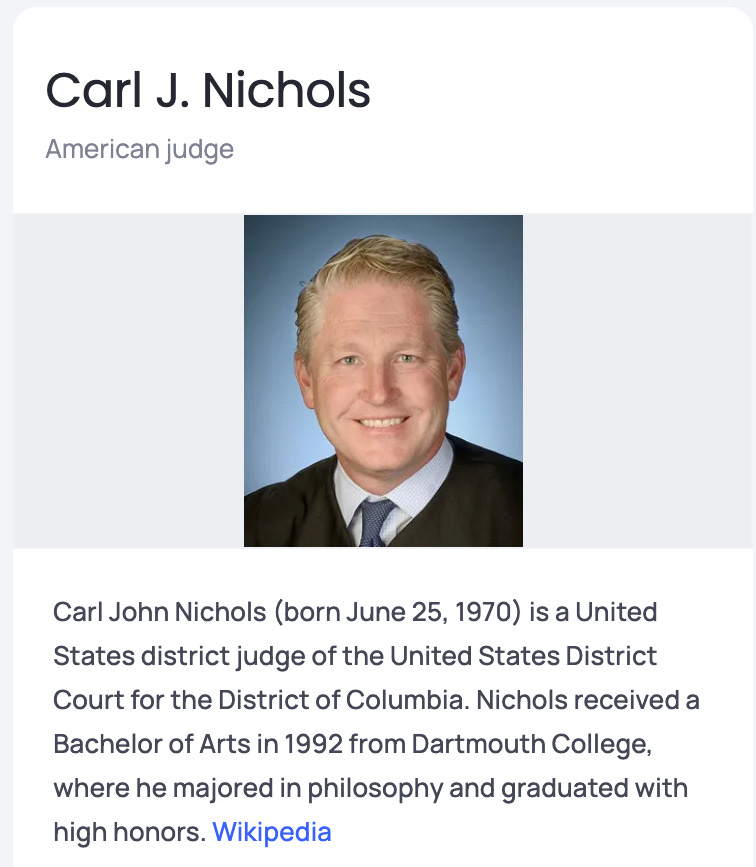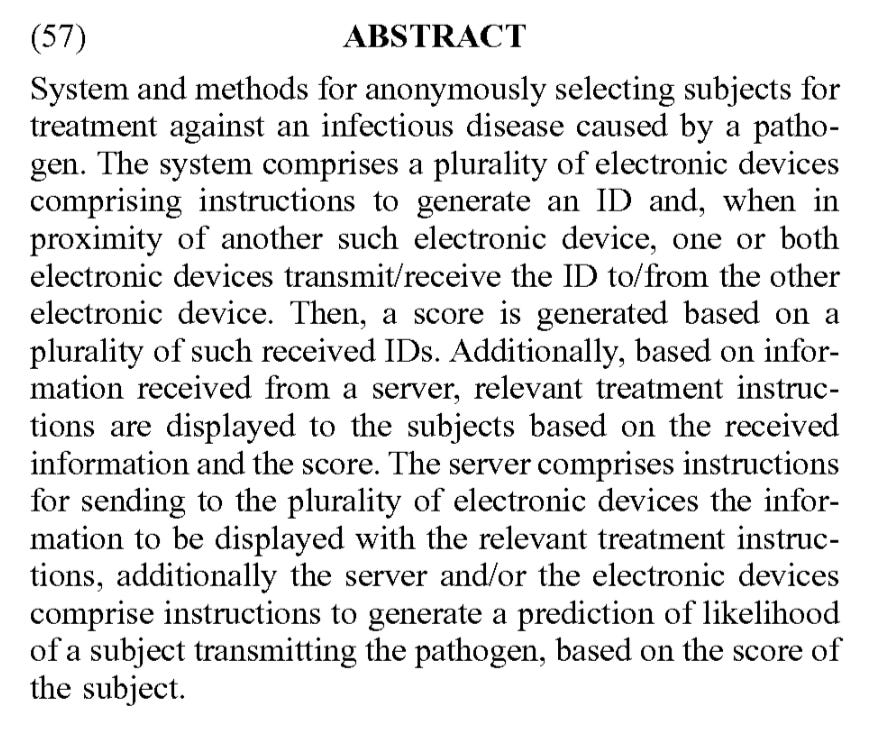Hey, you know that HUGE acquisition that just happened? That basically gave United Health Group a monopoly?
Oh you didn't hear about that? Weird.
I’ve noticed this trend, perhaps you’ve heard whisperings about it as well. It’s this globalist agenda thing. If you don’t know what I’m talking about, please take a look at the video below.
Cliff’s notes? Basically everything, and I mean EVERYTHING, is owned by a small group of corporations.
Before digging into the next bit, I would like to note that the only reason the acquisition I’m about to present was on my radar, is because I know someone that knows someone involved — I didn’t see a mf thing about it anywhere else. The more I heard from my friend, the more stench I smelled. So I decided to take a look at this very large ($8 billion) acquisition. One that gave the largest U.S. health insurer access to its competitors' data…which certainly looks like meeeebeeee it could be a monopoly that violates some antitrust issues. This falls well outside my scope of practice, but at this point that’s pretty much a given, so just consider your source and do your own research, yada, yada, yada.
Some back story, to start:
FOR IMMEDIATE RELEASE
Thursday, February 24, 2022
Justice Department Sues to Block UnitedHealth Group’s Acquisition of Change Healthcare (source)
Acquisition Would Allow Health Care Giant to Use Competitively Sensitive Claims Data of Hundreds of Millions of Americans to Reduce Competition and Innovation to the Detriment of Health Insurance Consumers
The Department of Justice, together with Attorneys General in Minnesota and New York, filed a civil lawsuit today to stop UnitedHealth Group Incorporated (United) from acquiring Change Healthcare Inc. (Change). The complaint, filed in the U.S. District Court for the District of Columbia, alleges that the proposed $13 billion transaction would harm competition in commercial health insurance markets, as well as in the market for a vital technology used by health insurers to process health insurance claims and reduce health care costs.
“Quality health insurance should be accessible to all Americans,” said Attorney General Merrick B. Garland. “If America’s largest health insurer is permitted to acquire a major rival for critical health care claims technologies, it will undermine competition for health insurance and stifle innovation in the employer health insurance markets. The Justice Department is committed to challenging anticompetitive mergers, particularly those at the intersection of health care and data.”
“The proposed transaction threatens an inflection point in the health care industry by giving United control of a critical data highway through which about half of all Americans’ health insurance claims pass each year,” said Principal Deputy Assistant Attorney General Doha Mekki of the Justice Department’s Antitrust Division. “Unless the deal is blocked, United stands to see and potentially use its health insurance rivals’ competitively sensitive information for its own business purposes and control these competitors’ access to innovations in vital health care technology. The department’s lawsuit makes clear that we will not hesitate to challenge transactions that harm competition by placing so much control of data and innovation in the hands of a single firm.”
→ BUT WAIT, THERE’S MORE ←
Here are six of UnitedHealth's biggest mergers and acquisitions of 2022:
1. UnitedHealth Group's Optum acquired Refresh Mental Health from private equity firm Kelso & Co., Axios reported March 24, citing sources. Jacksonville Beach, Fla.-based Refresh runs a network of more than 300 outpatient sites across 37 states and has more than 1,500 employees.
2. Optum agreed March 29 to buy Lafayette, La.-based LHC Group in a $5.4 billion deal. LHC employs about 30,000 people, including front-line care providers and administrative and support personnel. It has operations in 37 states and cares for more than 500,000 patients annually.
3. Optum finalized a deal to acquire Houston-based Kelsey-Seybold Clinic, Axios reported April 4. Kelsey-Seybold is a group practice offering treatment in 55 medical specialties across 24 locations in the Houston area and employs more than 500 physicians and allied health professionals.
4. The Massachusetts attorney general's office gave Optum clearance to buy Atrius Health, a 30-location independent physician organization, on April 21. With the approval, Optum plans to pay $236 million for the Newton, Mass.-based health system, which includes 645 physicians and primary care providers.
5. UnitedHealth disclosed in a regulatory filing it acquired KS Plan Administrators, a Medicare health insurer in Houston, the Star Tribune reported Aug. 16. KS Plan Administrators is affiliated with Kelsey-Seybold. KS Plan Administrators covered about 41,000 Medicare beneficiaries and generated about $147 million in premium revenue in the first quarter of 2021.
6. UnitedHealth completed its $7.8 billion acquisition of Change Healthcare on Oct. The deal merges Optum Insight with the healthcare data and analytics giant. The completed merger comes after a federal judge cleared the path for UnitedHealth Group to move forward with the acquisition of Change Healthcare. The deal, which was highly scrutinized by the federal government, was previously called anticompetitive because Change Healthcare has access to data from insurer customers. (source)
The Justice Department had argued that the deal would give UnitedHealth a virtual monopoly on an important tool that health insurers use to determine when a claim should be paid. And it said the company shouldn’t be allowed to own Change Healthcare’s data clearinghouse, which rival insurers use to compete with UnitedHealth. (source)
“completed merger comes after a federal judge cleared the path for UnitedHealth Group to move forward with the acquisition of Change Healthcare.”
Naturally I was curious about the federal judge that “cleared the path”.
His name is Carl Nichols.
The Wall Street Journal’s Anna Wilde Mathews and Brent Kendall reported that “The Justice Department’s top antitrust official, Jonathan Kanter, said the department disagreed with the decision and was considering its next steps,” they wrote, quoting Kanter as stating that “Protecting competition and access to affordable healthcare is of the utmost importance to the antitrust division and the Department of Justice.”
The Justice Department had argued that the deal would give UnitedHealth a virtual monopoly on an important tool that health insurers use to determine when a claim should be paid. And it said the company shouldn’t be allowed to own Change Healthcare’s data clearinghouse, which rival insurers use to compete with UnitedHealth. (source)
I thought I should take a look at some history before I made any super crazy assumptions about things we know RARELY go on like conflicts of interest, and MONEY influences. You know things that increase people’s ethical flexibility (I totally wish I could take credit for that term, but it was the incomparable, Sage Hana).
I found the following regarding Judge Nichols, which I’m just noting, is in the same arena as our United Health acquisition.
(Reuters) - The biggest U.S. drug industry group has won a court order striking down a federal rule meant to ensure that financial assistance offered by drugmakers to patients is not captured by insurers.
U.S. District Judge Carl Nichols in Washington, D.C. sided with the Pharmaceutical Research and Manufacturers of America (PhRMA) on Tuesday in finding that the U.S. Department of Health and Human Services overstepped its authority when it passed the rule in 2020. (source)
Judge Nichols landed on the side of Pharma in a duel between Pharma and the insurance industry. Which is it kind of like picking sides in the case of Dr. Evil suing Darth Maul, so let’s not pass too much judgement.
→ And then I found this interesting addition to Judge Nichols’ CV here:
The judge, Carl J. Nichols, a longtime corporate lawyer who was appointed to the United States District Court for the District of Columbia in 2019 by President Donald Trump, had bond holdings in Apple and Microsoft when he was assigned the case at the end of 2019. Then, in 2020, while the case was pending before him, he purchased more bonds in both companies, according to an appeal filed against his decision in last month. A separate filing that includes Judge Nichols financial disclosure forms shows that in 2020 he purchased bonds in Apple seven times, and Microsoft five times, holdings valued between $60,000 and $200,000.
The plaintiffs also pointed to another flurry of investments Judge Nichols made in tech-focused ETF funds dominated by holdings in four of the defendant companies. Over several transactions in 2019 and 2020, before and during his time overseeing the case, Judge Nichols held between $265,00 and $550,000 stock in Vanguard Growth – a fund dominated by shares in Apple, Microsoft, Alphabet and Tesla(source)
So the Honorable Judge has had some questions regarding his ethical flexibility in the past. Let’s just take a little peek, in light of this very large aggregation of “health” shit under one group….
I thought, well, Nichols neglected to recuse himself in at least one known prior case, meeebeee I should start there. Seems like someone else might have started there too…but not that I can find. Weird.
I managed to pull up Nichols’s 2020 financial disclosure. I’m scrolling through…and there’s A LOT of BlackRock.
Probably not relevant to our United acquisition though.
Oh snap…
Fintel reports that BlackRock has filed a 13G/A form with the SEC disclosing ownership of 74.42MM shares of UnitedHealth Group Inc (UNH). This represents 8.0% of the company.
In their previous filing dated February 1, 2022 they reported 69.28MM shares and 7.40% of the company, an increase in shares of 7.42% and an increase in total ownership of 0.60% (calculated as current - previous percent ownership). (source)
Oh neat, here’s Vanguard and Berkshire Hathaway.
You might remember those names, along with BlackRock from the video I shared earlier (you know, the three corporations at the top of the racket pyramid, I’ll call it the Rackamid now).
And whatdyaknow:
VTSMX - Vanguard Total Stock Market Index Fund Investor Shares holds 27,904,320 shares representing 2.99% ownership of the company. In its prior filing, the firm reported owning 27,627,171 shares, representing an increase of 0.99%. The firm increased its portfolio allocation in UNH [that’s United Health Group, fyi] by 3.52% over the last quarter.
Former Vanguard CEO Bill McNabb Loaded Up on UnitedHealth Stock
F. William “Bill” McNabb III, the former chairman and CEO of investment giant Vanguard Group, has made a bold purchase of UnitedHealth Group stock (UNH). McNabb serves as a director on the board of the diversified health-care company.
Whoa! McNabb sure is a 🍀LUCKY🍀 guy. It is obvious that this GINORMOUS United Health Group acquisition (the one that happened AFTER Mr. McNabb’s “bold purchase”) is squeaky clean.
Ok, back to the Judge Nichols disclosures. There’s this:
It’s kinda small, so I’ll put it in larger font here.
UNITED HEALTH GROUP
That’s right. The judge that “cleared the path” for this monopoly merger was financially invested in Vanguard, Berkshire Hathaway, AND United Health Group. What a COINCIDENCE. Yep, that judge. The one that has historically had some questions regarding his ethical flexibility when it comes to his financial holdings. Coincidences are so hot right now.
Now these are his financial disclosures from 2020, the most recent I could find anyway…so we can only speculate about 2021 and 2022.
Speaking of coincidences….I wonder 🤔 if, and this is a crazy IF…
But could a big monopoly acquisition like United Health Group, possibly have any broader implications? It probably wouldn’t integrate with anything having to do with this:
Gosh, maybe if there weren’t so many fucking hands in that overrated free market, they’d get
counter measures
medical tyranny
fascism
I mean,
~ HEALTHCARE ~
~ ~ for your own good ~ ~
RIGHT next time. Yeah. Because they allllmost nailed it this time with Covid. I mean…we lined up for testing that was never meant to test for the thing we were not properly testing for, wore obviously ineffective masks, and did completely ridiculous shit like wear a mask to the table and then take it off to sit down (that happened). And then there was the mass acceptance and uptake of an unauthorized injectable product, with the impossibility of proper testing. There were and are, TONS of safety signals.
And then they said give it to your kids. And some people did.
I wonder if, there were like, a giant system that controlled all the medical “stuff”, if that would make implementing countermeasures go a little more fascist smoothly next time? I wonder…🤔
You know what I’ve always wanted?
A Vaccine Passport?
The availability of vaccines during the height of the COVID-19 pandemic prompted the idea of implementing a vaccine passport system. The concept was that an official registry of who was vaccinated would allow companies to fully open for business to anyone who shows proof of vaccination, thus helping to boost economies while limiting the spread of the disease.
A 1938 Nazi Law Forced Jews to Register Their Wealth—Making It Easier to Steal
Eighty years ago, the edict marked a turning point in the Nazi party’s efforts to push Jews out of the German economy
When Adolf Hitler first came to power in 1933 thanks to the Enabling Act that gave him and his ministers all legislative control, the German economy was still reeling from the Great Depression. Hitler committed his government to two main economic policies: military armament and Autarky, or economic self-sufficiency.
Good thing that sounds toooootally different than this:
😮💨 Phew…glad we are free.















That is a masterpiece.
Excellent digging and uncovering.
Cross posting this.
Rackamid🤣🤣🤣
On a serious note, this just illustrates the magnitude of all the things THEY are doing, that we are missing...as we are artfully distracted with by the Scamdemic soap opera.
We need to move from finding out about these moves accidentally, to predicting and searching for them, before they happen.
Great work!!
"Coincidences are so hot right now."
Love it, gonna use that line in Real Life.